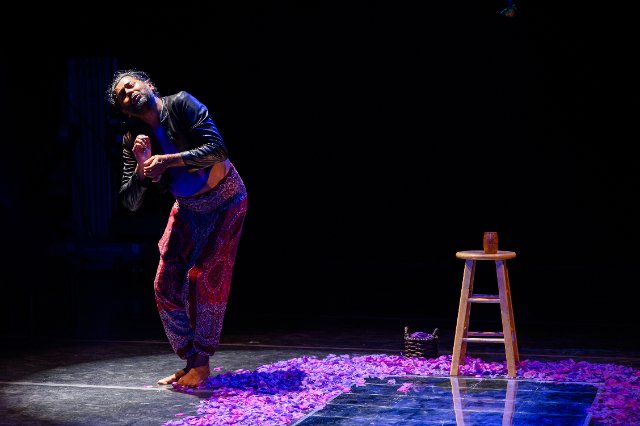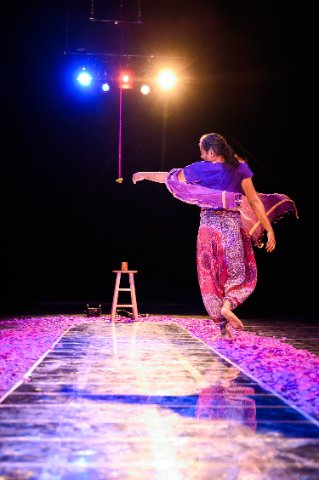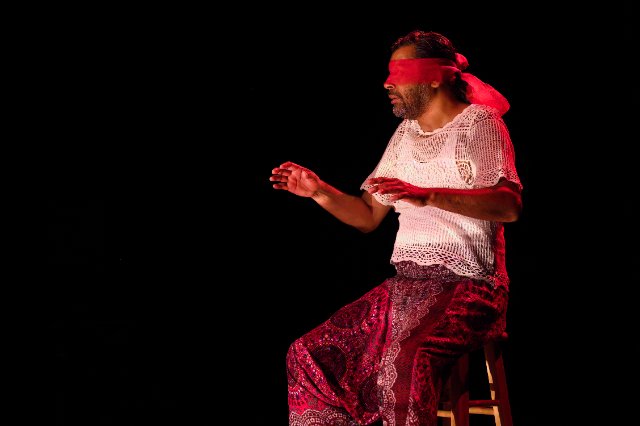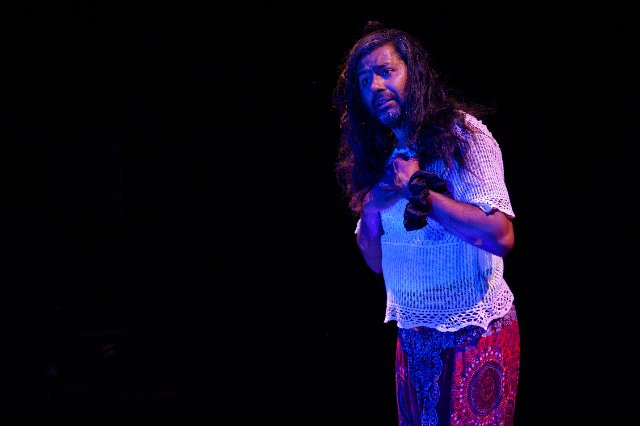Mahabharata
A Highly Abbreviated Version of the Longest Poem Ever Written
By: Victor Cordell - Aug 14, 2023
Comprised of 100,000 couplets, the “Mahabharata” is the longest known poem ever written. Logging in at 1.8 million words, it is around three times as long as the Bible, depending on which version is being considered. So, it is no surprise that trying to transform its multitude of stories into performance art would be daunting. Condensing it in some form into a solo dramatic performance of under two hours is a Herculean task. This is what playwright Geetha Reddy has accomplished.
Although not designed to be a sacred Hindu religious text, as were the four vedas which preceded it, the epic “Mahabharata” is considered by most to be the fifth veda. Written in the 3rd century BCE and attributed to poet Vyasa, it retains a wide following today as its cultural narratives still resonate.
Oakland Theater Project produced this play, written by local playwright Geetha Reddy, in 2019, and reprises it now, so OTP is clearly confident of its worth. As with the premiere, this one-person show is delivered by actor J Jha, whose performance is sterling, with supporting artistic elements orchestrated by Director Michael Socrates Moran. The spellbinding and fast-paced delivery of the saga is full of energy, conviction, and credibility.
Jha is transgender, which is relevant to the storytelling, because he/she portrays male and female characters, and because sexual ambiguity plays a role in some of the stories. She/he effectively uses several different voices, and more importantly, displays an emotion to fit every situation. Jha laughs, cries, rages, moans, and more – all the while in grand gesticulation - dancing, stomping, and breaking the fourth wall in frequent eye contact directly with the audience. It is a performance to behold.
In the opening vignette from the text of the poem, a woman is setting her son in a basket on a river, reminiscent of the Judeo-Christian story of Moses. This and other aspects of the work show how universal some literary themes are, but there are also major differences. One departure from Western religious scriptures is the extent, scope and candid discussion of sexual matters including polyamory, illicit affairs with outcomes, and menses banishment in the “Mahabharata,” which is ironic, given that Indian movies are not even allowed to show kisses.
Notwithstanding moral issues, the central narrative concerns the Kurukshetra War between royal cousins, the Pandavas and the Kauravas. Its scale is epic with millions of soldiers and more elephants than probably existed on earth. Its outcome is near apocalyptic. Of the many subplots in the poem, time allows for few to be told, and so the conceit is used that they will be selected by the storyteller’s rolls of the dice. Stories like Chitrangada, the Warrior Princess of Manipur, luring Arjuna into marriage, and Draupadi’s husband Yudhishthira “losing” her in a dice game, both engage and reveal aspects of Hindu cultural heritage.
The production entertains because of the exoticism and the scintillating performance. It does beg the question, however – what is the playwright’s objective? If it is to understand the play at anywhere near the same level of competence as reading the script, that is not going to happen. Attendees with a nodding familiarity of Arjuna, Ganesh, Krishna, and several others will perhaps grasp more and have a head start in knowing to stay focused when their names come up. But what about Kunti, Sanjay, and the tens of other names that are introduced, some only once, while others do become main characters? I only “got” Chitrangada and Yudhishthira through research after the play, not from the performance. Other names did not connect with me at all.
The point is that appreciating “Mahabharata” at an impressionistic level with some snippets fully comprehended is fairly easy. Understanding at a detailed level is difficult as three factors preclude accurate comprehension. As noted, way too many characters are introduced, some of which have no real bearing on central issues. The solution to that problem is in the hands of the playwright. Also, Jha’s delivery is exceptionally rapid, which makes it hard to even understand the names. Rather than rein in the pace and enthusiasm in the performance, this would be the perfect occasion to flash projections with the character’s name and perhaps a visual representation of a character when introduced. Finally, the house is set up with split-sides audience. Whenever Jha faces away to one wing of the house, the words are somewhat to totally lost to some audience members on the other side. These last two issues are controllable by the producers.
Despite these issues, theatergoers with an interest in or curiosity about Indian culture will find this a rewarding experience.
“Mahabharata” is written by Geetha Reddy, based on the epic poem of the same name by Vyasa, produced by Oakland Theater Company and Z Space, and plays at Z Space, 450 Florida Street, San Francisco, CA through August 20, 2023.




